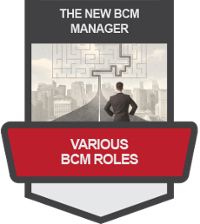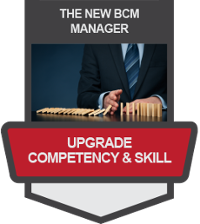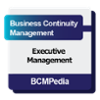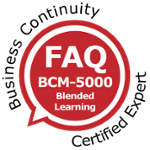Business Continuity Management: What is My Role?
Before embarking on their BCM journey and upon initial analysis, it is observed that organisations fall into two groups;
- The first group do not actively monitor and manage their BC program,
- while the other group, despite acknowledging the importance of managing it, find that progress is difficult beyond the initial year of implementation.
 While both groups understand the need to manage and maintain their program and keep it relevant to the organisation, most are at a loss about what needs to be done and how.
While both groups understand the need to manage and maintain their program and keep it relevant to the organisation, most are at a loss about what needs to be done and how.
This post attempts to help address this issue and serves as a guide for the various parties within an organisation to choose their appropriate BCM training journey.
Identify BCM Roles

 We must first identify and clarify the roles and responsibilities of different parties within the organisation.
We must first identify and clarify the roles and responsibilities of different parties within the organisation.
Once a personnel’s role has been identified, references are made to each role’s competency needs and its recommended training journey.
These roles include:
Develop Training Roadmap
This training roadmap also acknowledges the need to train general staff members who may not be directly involved in BCM but still need to understand their role in a disaster.

Organisation BCM Coordinator
 The Organisation’s BCM Coordinator is essentially a Subject-Matter-Expert in the organisation’s BC program.
The Organisation’s BCM Coordinator is essentially a Subject-Matter-Expert in the organisation’s BC program.
S/he is the person who would project manage the initial implementation of the BCM plan for the organisation, oversee the management of the plan, and maintain the plan upon its implementation.
Typically a full-time position in medium- to large-sized organisations, the Organisation BCM Coordinator is responsible for coordinating the organisation’s BC program.
 It is vital that the Organisation BCM Coordinator has detailed knowledge of the organisation’s operations and critical functions, and is equipped with in-depth business continuity knowledge, to conduct a thorough review of all BC Plans and to formulate organisation-specific tests and exercises.
It is vital that the Organisation BCM Coordinator has detailed knowledge of the organisation’s operations and critical functions, and is equipped with in-depth business continuity knowledge, to conduct a thorough review of all BC Plans and to formulate organisation-specific tests and exercises.
So, what is the learning roadmap for an organisation BCM Coordinator? Also read "As A BCM Manager, What Can I Do To Improve My BCM Competency and Skill?" [click icon on left]
Business Unit BCM Coordinator
 The key responsibility of the Business Unit (BU) BCM Coordinator is to assist the Organisation BCM Coordinator and to represent their respective business units.
The key responsibility of the Business Unit (BU) BCM Coordinator is to assist the Organisation BCM Coordinator and to represent their respective business units.
These appointed BU BCM Coordinators are the various BU-level personnel comprising the different business units within an organisation. What Does My Business Unit BCM Coordinator Need to Improve Their BCM Competency and Skill?
Senior Management

An organisation’s senior (executive) management is responsible for setting direction and approving modifications to BC plans.
Members of management often serve on the organisation’s BCM Steering Committee, which also comprises the Organisation BCM Coordinator and key BU BCM Coordinators.
It is essential to remain aware of the organisation’s BC readiness, which is achieved through the Organisation BCM Coordinator’s reports and updates on the results of various tests and exercises.
During a crisis, the BCM Steering Committee typically morphs to become the Crisis Management Team.
Crisis Management Team
As leaders of the Crisis Management Team, Management will direct the overall strategy to address the crisis. Hence, some knowledge of plans and strategies developed is required, and these are honed through participation during organisation-wide tests and exercises.
Read more about "What BCM Competency and Skill Should My Senior Management Have?"
Recovery Team and Staff Members

It is observed that the staff members who form the bulk of the response or recovery team are the least trained among the four stakeholders.
These part-time BCM professionals are often neglected because of their limited involvement during “peacetime,” as the BU BCM Coordinator handles the BU-level plan's administrative role.
Knowledge of what to do and where to go during a crisis or disaster can both save lives and costs to the organisation as well as speed up the process of business recovery.
Often, the retrieval of critical items such as vital records, laptops, and backups is part of BC Plan procedures. Such retrievals during an evacuation may fall under the responsibilities of general staff members.
Therefore, briefings must emphasise both the importance of BC Plans and the significance of their roles in maintaining an organisation's continuity following a disaster.
The organisation may determine the level of staff involvement in the BC process by identifying those required to continue the operation of critical business functions. Briefings detailing their crisis response duties and roles are helpful for these staff.
To learn more about raising the awareness of the general staff members, click: How Do I Prepare and Train The rest of My Organisation Staff members on BCM?
What is the Competency to Participate in the BCM Program Effectively?
Now that we have briefly described the category of participants for this BCM project or program. Appropriate training and awareness processes must be provided to these groups before implementation begins.
BCM roles and responsibilities are often regarded as secondary appointments or "Extra-Curricular Activities," and hence these appointed functions are usually accorded little seriousness.
It is often challenging, for example, for a BU BCM coordinator to upgrade and enhance the content of the BCM submission well; they should be provided with the previous or last submission of the BCM submission by their predecessors and are expected to complete the requirement with no prior BCM understanding and knowledge.
For those who are experienced and seeking to progress in their careers, it is time to review and develop your learning roadmap to accelerate your knowledge and skills, and, most importantly, your career.
Attend a Course to Develop the Training and Learning Roadmap
Suppose you are keen on spending some time analysing your organisation's BCM requirements and intend to implement a training and learning roadmap for the entire organisation. In that case, you may want to attend the "Developing a BCM Training and Learning Roadmap" course (WSQ-BCM-470).
For courses attended by Singaporeans, you may only pay S$165 for a one-day, fully hands-on course, or click the button to find out more.
Are There Any Good BCM References or Guides?
 The institute has published a specialised BCM book called "A Manager’s Guide to Implement Your BCM Training and Learning Roadmap." Click the book cover or BCM Specialist Book Series to get an overview of this book.
The institute has published a specialised BCM book called "A Manager’s Guide to Implement Your BCM Training and Learning Roadmap." Click the book cover or BCM Specialist Book Series to get an overview of this book.
Alternatively, you could purchase from the BCM Institute Book Store: A Manager’s Guide to Implement Your BCM Training and Learning Roadmap. [click book cover on right]
Useful References
A list of the other references can be found in BCM Planning Book Series: Implementing and Managing Your BCM Project and Program. A list of the other references can be found in "What Are BCM References That Is Useful?"
The New Manager Series
 |
 |
 |
 |
 |
 |
 |
|
| Understand Your Organisation | Build Competency | Common Mistakes to Avoid | Various BCM Roles | Perform a Gap Analysis on Your BCM Program | Improve BCM Competency and Skill |
|





![Register [BL-B-3]*](https://blog.bcm-institute.org/hs-fs/hubfs/hub_generated/resized/19a8306f-6b76-45ff-8585-95111f393aeb.png?width=200&height=56&name=19a8306f-6b76-45ff-8585-95111f393aeb.png)



![FAQ [BL-B-3]](https://blog.bcm-institute.org/hs-fs/hubfs/hub_generated/resized/9b7f5669-8ad6-450b-a98f-5f5d49ebfc8e.png?width=150&height=150&name=9b7f5669-8ad6-450b-a98f-5f5d49ebfc8e.png)
![Email to Sales Team [BCM Institute]](https://blog.bcm-institute.org/hs-fs/hubfs/hub_generated/resized/83ae9ad3-affc-416e-8f51-64218d6d98f2.png?width=100&height=100&name=83ae9ad3-affc-416e-8f51-64218d6d98f2.png)





